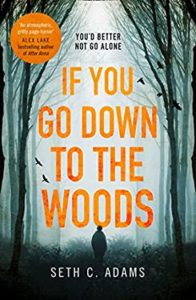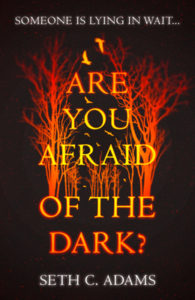Strand Magazine intern Kierstin Singer had the opportunity to interview Seth Adams, author of If You Go Down to the Woods Today (2018) and Are You Afraid of the Dark? (2019). Read this Q&A if you want to enter the Literary Mind of Seth Adams!
- Is there a difference between a writer and an author?
Although these terms can be used synonymously in everyday usage, in my mind I prefer to think of myself as a writer. ‘Author’ can denote authorship of any of a great variety of work—a play, a novel, a poem, a piece of music, a term paper…heck, even the compiler of grocery ingredients lists can be called an author. ‘Writer’ more explicitly signifies the act of writing, which, for someone who wants to make a career out of storytelling, is an activity that is never ending. As a writer, you should always be writing, thinking about writing, reading the writing of others, and in general finding all the spare time you can to be improving your craft.
- Of the books you’ve written, do you have a favorite?
Many writers say their favorite book is whatever they’re currently working on, and this is true for me as well. If you long for some past work, thinking to yourself ‘Wow, that story was great! How can I follow that?’ you are almost implicitly signifying a level of self-doubt that can be dangerous, and bring a writer to a standstill. So, I actually don’t even start a novel unless I know I’m completely invested in the characters, their stories, and whatever lies ahead for them. If I’m truly opening myself to each story and its cast of characters, allowing those people to fully exist in my imagination, then I can’t help but be wholly engaged in that story, rather than dwelling on what’s come before.
- Which literary character do you relate to the most?
I can’t think of a single, specific character I relate to…but I can easily think of an archetype—the classic boy-and-his-dog coming of age stories, like WHERE THE RED FERN GROWS, OLD YELLER, and BIG RED. There’s something very special about dogs, and their complete devotion to human beings, that’s borderline miraculous. Be it merely evolutionary in nature, and a product of the 40,000 years of domestic dog and human partnership, as well as the sometimes symbiotic relationship between wolves and early modern humans hundreds of thousands of years earlier; something more spiritual in nature; or a combination of both; the relationship between humans and dogs is unparalleled in nature. Recent research by Dr. Gregory Berns showing MRI scans of dog brains and the glimpse into their cognitive and emotional lives; as well as Dr. John Pilley’s work with Chaser the border collie, showing Chaser’s language comprehension skills perhaps out performing even that of Koko the gorilla; are amazing testaments to the unique nature of dogs. I have had the great fortune—and terrible heartache—of having had and outlived several amazing, beautiful dogs in my lifetime, and I’m a sucker for those stories.
- If you could meet any character in your books, which character and why?
Referring back to the previous question regarding literary characters I relate to, I’d probably have an interesting time with Joey Hayworth, the narrator of my first novel, IF YOU GO DOWN TO THE WOODS. A quasi-autobiographical character, Joey is a comic book fan, has an at times politically incorrect sense of humor, and loves his dog to death—all qualities I can appreciate! We’d have a lot to talk about! But he’s far more of a fighter than I am, so if things got heated, I’d probably back off. Plus, adults probably shouldn’t hit minors.
- What does your writing process look like?
When I’m actively working on a new project, I write during the early morning—around 4AM—and don’t break for a few hours. I usually start by re-reading what I wrote the day before to refresh my memory of events, chronology, etc., then continue on from there. I never stop a writing session mid-scene, leaving an action or major plot point unfinished, but I DO try to stop somewhere in the narrative when I have at least an idea of what comes next. That way, the next day’s writing can start off as smoothly as possible. Also, when I’m writing a new novel, I commit to writing every single day—no exceptions! —until the story is finished. Even if I’m under the weather, injured, whatever, even if it’s a shortened writing session, I write every day until the story is done! If a person wants to be a writer, then that means they should be treating writing like a job, and just like any job you want to succeed at, it requires discipline and commitment to do it well.
- Have you taken any risks while writing? Did taking these risks pay off?
This is a good question. The one ‘risk’ I take is something I strongly feel shouldn’t be a ‘risk’ at all, but unfortunately is in today’s sensitive socio-political climate. The best writers develop ALL their characters in as believable a manner as possible—this means both protagonists AND antagonists. Yes, that means the ‘bad guys’ (not necessarily synonymous with antagonists, but we’ll set that aside for now) should be as well constructed and believable as the ‘good guys’ in a story. Good writers of any and every genre, no matter how fantastic the story, consistently delve into the thoughts, feelings, motives, and actions of even their most unsavory characters. Murderers, rapists, thieves, racists, sexists, and every other imaginable sort of monster should be as honestly presented as any other character to fully invest a reader in the story. Bad guys are as important an element of a good story as the setting, the plot, the pacing, and yes, the good guys. There’s a reason why Stephen King, Dean Koontz, George RR Martin, and Cormac McCarthy have been at the top of their respective genres for decades. They commit to every aspect of each and every story they tell…even the unsavory ones. Unfortunately, there exists in the reading public a subset of readers who have difficulty separating fiction from real life, and attribute these unsavory qualities of fictional bad guys (or gals) to the writer him or herself, in some misbegotten pursuit to erase all evil from the world, which is impossible.
- Does writing energize or exhaust you?
A little bit of both. That feeling a writer gets when he/she knows deep down they’ve hit on something special is something unequaled in my experience. Yet, putting the characters of those stories through the wringer as they travel down whatever path they’re destined to travel can be psychologically taxing. Referring back to the question about risks, the more honest you are in your stories, the greater this exhaustion can be, as you can relate to both the positive and negative experiences all your characters go through. Death, grief, trauma, triumph, hope—if a writer is boldly and honestly dealing with these subject matters, they can’t help but reflect on some of the moments in their own lives that mirror these themes in their stories.
- Are you currently working on any new books?
I’m always either actively writing or thinking about what to write next. Along with this, I’m always reading as well. I recently finished a horror/speculative novel with series potential, bordering somewhere in the Young Adult/Adult space, that deals with many of the topics I’ve mentioned in this interview—racism, violence, death, hope, friendship—that I’m very excited about and have been shopping around. I also have half a dozen or so other completed works in various genres—suspense, thrillers, horror/sci fi—that I also occasionally send around to publishers/editors/agents. With a little luck—definitely needed in today’s horrible economy! –these works might find a home in the near future.


